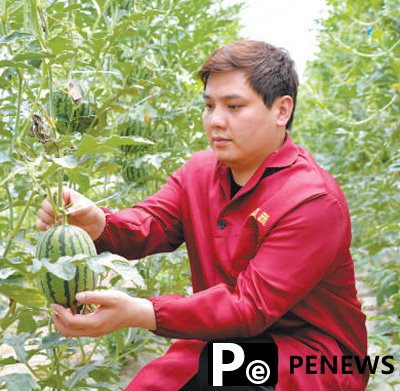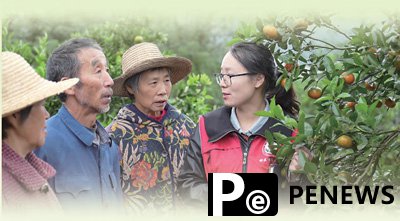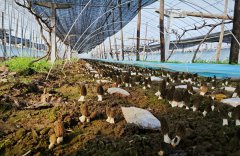Home>>
Young Chinese contribute to rural revitalization(People's Daily Online) 13:19, March 12, 2024
An increasing number of ambitious young Chinese are fueling the country's rural revitalization drive by relocating to the countryside to launch businesses aimed at boosting local production and incomes, as well as applying scientific innovations to enhance industrial growth.
Xu Feng, 35, leads a watermelon and vegetable cooperative in Shishou city, in central China's Hubei Province. He studied horticulture in college. After graduating, he joined his relatives in the curtain business in an urban area. However, in 2011, he shifted his focus back to the countryside when his father reported significant losses at the family's watermelon farm due to poor sales.

Xu Feng works in a watermelon field in central China's Hubei Province. (Photo courtesy of the interviewee)
Discovering that many households in the village were struggling with unsold, Xu immediately decided to return home to start a business to help his fellow villagers get out of trouble.
Thanks to Xu's relentless efforts to sell watermelons to supermarkets and fruit stores, his high-quality, low-priced watermelons gained recognition from both merchants and customers.
In 2012, Xu founded a watermelon and vegetable cooperative, which provided seedlings to farmers and supported them throughout the planting-to-sales process.
Currently, the cooperative operates five major planting bases covering a total area of over 5,000 mu (333 hectares) and boasts more than 5,000 steel-frame greenhouses, with over 350 members.
With technical guidance from the Hubei Academy of Agricultural Sciences, the Jingzhou Academy of Agricultural Sciences, and the School of Horticulture and Gardening of Yangtze University, Xu has developed a new planting model. This involves growing watermelons in two seasons and vegetables in one season annually to optimize land use.
To enhance the taste of the watermelons, Xu's cooperative collaborates with the Jingzhou Academy of Agricultural Sciences and introduces new varieties recommended by research institutes nationwide, experimenting to find the best new varieties.
Furthermore, the cooperative regularly organizes technical training sessions for key members, with over 6,000 participants in the past three years.
Employing organic farming methods and standardized planting techniques, the cooperative's watermelons have achieved grade-A green food certification.
The growth of the cooperative has enticed many young people who previously worked elsewhere to return, with young members now comprising over 30 percent of the total. In 2022, the cooperative generated an additional per capita income of more than 30,000 yuan ($4,170) for its members.
Moreover, the cooperative has established a new 4,000-square-meter modern seedling production facility, a 20,000-square-meter trading market for agricultural products, and a 1,500-tonne cold storage facility. Meanwhile, Xu has addressed certain technical challenges in watermelon cultivation and obtained several patents.
"The countryside in the new era is a land of promise and a fertile ground for entrepreneurship. Young people who return to their hometowns to make their contributions can enjoy bright prospects," Xu said.
Born in the 1990s, Ma Xiaoli, director of the Fruit Trees and Horticulture Research Office at the Chongqing Three Gorges Academy of Agricultural Sciences in southwest China's Chongqing Municipality, has been guiding fruit farmers to improve the cultivation of citrus trees, plum trees, and other crops.
Since 2017, she has traveled to over 10 districts and counties in the municipality, offering ideas and insights on how to develop the fruit industry, helping solve more than 20 production challenges.
In the summer of 2022, drought conditions affected many citrus orchards in Chongqing's various counties and districts. Ma promptly advised fruit farmers to prepare for the drought in advance.

Ma Xiaoli (first right) guides fruit farmers on citrus tree cultivation in southwest China's Chongqing Municipality. (Photo courtesy of the Chongqing Three Gorges Academy of Agricultural Sciences)
Ma and her team have become experts in understanding how well 51 different citrus varieties can survive drought, laying a solid foundation for breeding drought-resistant citrus. This has enabled them to better guide fruit farmers in improving irrigation methods.
Despite the drought, 13 demonstration orchards stabilized production, and one even increased production that year, seeing an average income growth of over 1,000 yuan per mu.
In addition to solving problems for fruit farmers, as well as providing guidance and training, Ma has dedicated herself to breeding new fruit tree varieties, researching, and promoting cultivation techniques.









